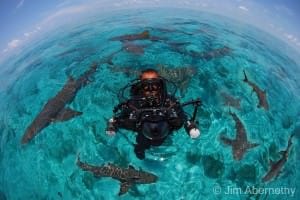This guest blog is by Jim Abernethy, renowned underwater photographer and pioneer in shark encounters without a cage. For decades he has interacted with the world’s most notorious sharks, most of which are labeled as “dangerous species”. He is best known as a crusader for their protection. His award winning marine life images are often featured in top photography magazines such as Wet pixel and Nature’s Best Photography. While running shark expeditions his business has hosted many of the worlds top nature filmmakers and magazines such as Imax, National Geographic, BBC Wildlife and the Discovery Channel. Abernethy lives in Palm Beach, Florida. You are invited to visit his website at www.scuba-adventures.com.
Courtesy of Sailors for the Sea.

Sharks today are facing the threat of extinction. It is estimated that nearly 100 million sharks are needlessly harvested from the ocean each year. Scientists believe that if sharks become extinct we will essentially destroy the delicate balance that is necessary for the survival of thousands of marine species! Severe depletion of certain species is already revealing devastating effects in some areas of the world. Allowing the marine ecosystem to collapse is not an option for mankind. Considering the fact that at least one third of the oxygen we breathe, and a large percentage of the food we eat, come from the ocean, immediate change from present day practices must be mandated if we are to ensure a healthy future for all. We have the knowledge and means to implement prudent restrictions, but will we actually make the changes necessary to avoid an otherwise imminent environmental quagmire?
As a nature photographer, conservationist and owner of a live-aboard dive ecotourism business, I have lived at sea for the last decade; I spend the majority of my life underwater. Diving with large predatory sharks in their natural environment (without a cage) has allowed me to witness firsthand the true and gentle nature of these animals. What is also remarkably evident is the serious decline in their numbers. While my passion to observe and photograph sharks all over the world continues, it is undoubtedly becoming more challenging to find them. As a photographer and filmmaker, I strive to bring their beauty and magnificence to those who would otherwise not experience these awesome creatures up close; all in the hopes of inspiring more people to advocate for their survival. Most people only see sharks through the lens of the media that perpetuates the misconception that they are man-eating monsters. The truth is, we pose the greatest threat-not just to sharks, and marine life in general, but to our own existence on the planet. When we continue to exploit the ocean’s resources, instead of coming to a place of appreciation and ethical stewardship, we harm ourselves the most. Preservation of our biodiversity not only demonstrates vision, it protects the natural resources so essential to our own survival. Sharks are not dispensable.
There are roughly 500 known species of shark and they have graced this planet for nearly 415 million years. Yet today, sadly, only ten percent of the large predatory sharks remain worldwide-only three are protected by restrictions on international trade (the basking, whale and white sharks). Like mammals, most sharks mature late in life and only produce a few offspring; too often sharks are harvested before they have had a chance to reproduce. Present day fishery regulations, primarily designed for bony fishes, are not adequately protecting sharks. Species such as the great white, hammerheads, tigers, bulls, lemons, and oceanic whitetip sharks are likely to face extinction in the not too distant future unless a resolution for their preservation is demanded by the public and enforced by governments worldwide.

As mentioned in my new book, Sharks Up Close, the primary offenders to shark populations are the fisheries that provide catch for the Asian delicacy, shark fin soup. The shark fins are cut off, then the fish is thrown back and left to drown. Because this occurs at sea, few people are aware of this inhumane routine. Can you imagine the public outcry if anyone could remove the appendages of selected land creatures (such as dogs), only to leave them in the street to die? We protect many national treasures by designating them as parks, but sadly we do very little to protect pristine offshore regions. At the time of this writing, while the Gulf coast is suffering incomprehensible damage from the BP oil spill, less than .5 percent of the world’s oceans are under some sort of protected status. According to leading conservationists, at least twenty percent of the world’s underwater areas should be protected as a marine reserve-the Gulf coast is a prime example of a location that needed those safeguards in place, for environmental and economic reasons. Palau is the first nation to designate an area as a “shark sanctuary”, and it is my hope other nations will follow this example.
Another major concern is the unsafe consumption of sharks because of the toxic levels of mercury found in them. “There is no known safe level of mercury”, according to World Health Organization. High levels of mercury may cause impairment of vision, speech, hearing, memory, and may also lead to sterility and sexual dysfunction. Outside of harvesting “poisoned” sharks for their meat, their existence is also threatened for the following reasons: fishing tournaments, commercial fishing by-catch, habitat destruction, and pollution. Some people believe shark cartilage supplements can cure diseases or heal ailments; it should be noted, there are no scientific studies to support this claim.

Many steps need to be taken to replenish shark and fish populations. As individuals, we can have a big impact on how business is done by being a conscientious consumer and only supporting sustainable fisheries. New regulations for fisheries-from the state level to worldwide-need to be put into place before it is too late. Better care of marine habitats and water quality is also key. Every effort makes a difference; from instituting marine reserves to private citizens signing petitions in protest of shark fishing tournaments. While “catch and release” is better than killing the fish, some species are unable to survive the trauma; especially true for larger species of shark. Global warming is of course also linked to the well-being of sharks.
It is our actions that have directly, and indirectly, caused them such harm; now it is us that must save them. John Sawhill said, “In the end, our society will be defined not by what we create, but what we refuse to destroy.” We are their only hope; future generations of sharks, and people, are depending on us.
We can all make a difference:
- Join organizations like SfS that work to protect our oceans
- Boycott shark products and businesses that produce them, such as Shark Fin Soup; Shark liver oil (squalene) based cosmetics and creams — Preparation H for example and many face creams, lip balms, etc. Endangered deep water sharks are targeted for their liver oil, and plant based alternatives are equally if not more effective; Nutritional supplements like shark cartilage and shark liver oil. Scientific evidence does not support the health claims of these products.
- Shark Jaw Souvenirs
- Reduce, Re-use, & Recycle
- Support “shark-friendly” officials such as US Senator John Kerry – Sponsor of S. 850: Shark Conservation Act of 2009; US Delegate to Guam, Madeleine Bordallo – Sponsor of H.R. 81: Shark Conservation Act of 2009; and Senator Clayton Hee who authored and introduced the historic SB 2169 to Prohibit the Sale, Distribution and Possession of Shark Fins in the State of Hawaii. This bill has passed the House and Senate and is expected to be signed into law within the next month by Governor Linda Lingle.
- Sign petitions that strive to PROTECT sharks from overfishing & pollution
- Fundraise for non-profit organizations such as: Shark Savers – http://www.wildaid.org/sharks; WildAid – http://www.wildaid.org; Shark Foundation – http://www.shark.ch; Iemanya Oceanica (Adopt-A-Shark) – http://www.iemanya.org
- If you fish, please practice “catch and release” and only fish for sustainable species
Learn what sharks are really like by going on a shark encounter with a reputable shark diving operation. Visit www.scuba-adventures.com to learn more about shark encounter expeditions.








